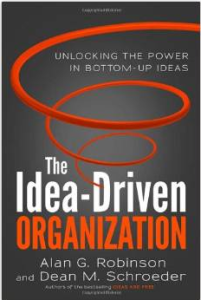I am halfway through reading, what I consider (thus far), an important lean book. Robinson and Schroeder’s T he Idea-Driven Organization: Unlocking the Power in Bottom-up Ideas is a very thoughtful, practical book on the topic of employee engagement and daily kaizen. Pure and simple, lean is not transformational without pervasive daily kaizen. So, read this book. …Anyway, Robinson and Schroeder refer to the work of Nobel Prize-winning economist Friedrich Hayek. I don’t know about you, but I wasn’t up on my Hayek. I’m glad that the authors made the introduction. Hayek identified two types of knowledge:
he Idea-Driven Organization: Unlocking the Power in Bottom-up Ideas is a very thoughtful, practical book on the topic of employee engagement and daily kaizen. Pure and simple, lean is not transformational without pervasive daily kaizen. So, read this book. …Anyway, Robinson and Schroeder refer to the work of Nobel Prize-winning economist Friedrich Hayek. I don’t know about you, but I wasn’t up on my Hayek. I’m glad that the authors made the introduction. Hayek identified two types of knowledge:
- Aggregate knowledge. This is ostensibly what top leaders possess (hey, stop snickering). It is developed through some level of intimacy with macro-level data and financial and operational performance information and analysis. This makes sense given the need for these folks to be able to absorb the big picture, set direction and formulate strategy. However, aggregate knowledge does have its limitations, especially when it is in the hands of those with a shortage of a key lean ingredient – humility. Even sufficient aggregrate knowledge in the hands (or head) of the un-humble can make top leaders feel that they know best. That means they can have the grand illusion that they know better than the folks who have the second type of knowledge, see below. This is folly, as proven out on a daily basis in so many companies and, I dare say, most every government organ. There’s a really good reason why central planning doesn’t work – the central planners lack the second type of knowledge, among other things (like true “stakeholdership”).
- Knowledge of the particular circumstances of time and place. This type of knowledge is derived from real-life, consistent gemba-based immersion. Folks who possess this knowledge, the ones who do the actual work at the actual place, by definition should be grounded in reality. (I say “should,” because not all folks sufficiently grasp the situation - their lean thinking may be immature or perhaps they’re not interested in acknowledging reality. It’s up to the leaders to help this along). In any event, with proper coaching and a good lean management system to facilitate problem identification and the targeting and flow of ideas, the people with this second type of knowledge are THE proper and most effective force to conduct kaizen.
There are at least a couple of things that the “aggregate folks” can do to help themselves gain some particular knowledge. Coincidentally, this will help the organization.
- As Fujio Cho, now honorary chairman of Toyota Motor Corporation, taught, leaders should religiously go see, ask why, and show respect. Much of this should happen within the context of well-developed leader standardized work.
- Leaders can periodically participate in kaizen activities firsthand with the stakeholders. This will force leaders to go to the gemba, directly and rigorously observe reality with their teammates, and only then, earn some of the necessary insight to share in local PDCA.
Similarly, the “particular knowledge folks” can obtain a least a modicum of aggregate knowledge, more like expanded line of sight, by the incorporation of frequent regular visual process performance metric (people, quality, delivery, cost, and rate of continuous improvement) reviews as part of their natural work team huddles. Less frequently, they should be apprised of performance at the more aggregated levels of value stream, business unit, etc. Now, we’re not saying that one type of knowledge is better than the other. Every organization needs both in order to survive and ultimately thrive. However, like most things in life, there needs to be a balance. But, here’s my humble advice to the aggregate folks - set policy and create alignment, establish the lean ecosystem vis a vis lean management systems, model lean leadership behaviors, challenge, encourage, and coach the “particular guys,” …and in a large measure, get out of their way. Related posts: Subsidiarity: A (Medieval) Lean Principle, Eight Ways to Avoid the Kaizen Roach Motel, Why Do You Ask?
